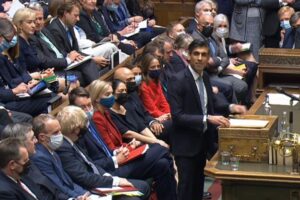
Rishi Sunak will push the button on a controversial windfall tax on energy companies on Thursday, as he lays out measures to ease the pain of rising household bills.
Treasury sources did not deny reports the chancellor would use his announcement to scrap the requirement to repay a previously announced £200 discount on energy bills for all households, or that he could increase the level of the grant.
Extra measures are also expected to target the poorest households in the cost of living crisis as rampant inflation pushes up the price of everything from food to fuel.
Sunak is expected to announce an increase in the warm home discount scheme, which is worth £150 to 3 million low-income households. This grant could rise to as much as £500.
The government could also bring forward a planned increase in benefits that had been expected next year or offer a council tax rebate.
The Times reported that the previously announced £200 loan on energy bills would be replaced with a grant that will not have to be paid back, with the discount possibly increasing to as much as £400.
The measures will be funded in part by a windfall tax on energy firms, after a fierce battle within the government over the policy, which has been bitterly opposed by some cabinet ministers including the business secretary, Kwasi Kwarteng. The measure could be extended to all electricity generators and may include exemptions for investments.
A senior party official admitted the decision had caused splits in the government. “The arguments have been tested rigorously both within the Treasury and within government and there is high pressure to make sure that the gain is worth the pain and that it does not jeopardise investment,” they said.
“We do not want to introduce random taxes that make the environment unpredictable for global companies that can go anywhere. We have to set the bar high and do something genuinely impactful and put in massive safeguards to ensure we do not jeopardise investment.”
The U-turn on the windfall tax will be seen as a win for Keir Starmer’s Labour, which has long called for such a measure. The Tory official said it would draw a clear dividing line.
“For Conservatives, raising taxes is a means to the end of funding public services and helping those who can’t help themselves. So the focus of any package will be on what it enables us to do to help people who are suffering,” they said.
“There will be a fresh package which will have an explanation of where some extra funds will be acquired … It will be genuinely impactful and comprehensive.”
Oil and gas producers have benefited from rocketing global energy prices during Russia’s war in Ukraine. Higher gas prices have pushed up wholesale prices across the electricity market, including for some producers of renewable and nuclear power.
The Treasury has reportedly analysed whether the tax should be expanded beyond North Sea operators such as BP and Shell to generators including renewable energy operators such as windfarms.
It is estimated the plan could tax more than £10bn of excess profits, although City analysts said that figure was far beyond their estimates. Labour’s plan for a one-off levy applied only to North Sea oil and gas producers would raise an estimated £2bn.
A Treasury spokesperson said: “We understand that people are struggling with rising prices, which is why we’ve provided £22bn of support to date. The chancellor was clear that as the situation evolves, so will our response, with the most vulnerable being his number one priority.”
Economists say living costs for Britain’s poorest households are expected to increase by almost twice the rate as those for the richest when energy bills rise this autumn.
The Institute for Fiscal Studies (IFS) said the fresh surge in gas and electricity bills expected in October could lead to average annual inflation rates of as high as 14% for the poorest 10th of households.
The energy crisis was thrown into sharp focus this week when Jonathan Brearley, the chief executive of the energy regulator Ofgem, indicated that the energy price cap would increase by a further £830 to nearly £2,800 in October.
The increase is likely to hit poorer families disproportionately because a larger share of their total spending goes on energy. The IFS said the poorest 10th of households typically spend almost three times as much of their budgets on gas and electricity as the richest 10th.
This means low-income homes are experiencing a much higher rate of inflation than the wealthy. The IFS predicts that while inflation for those on the breadline will reach 14% this autumn, the richest 10th could see rates of about 8%. Across all households, inflation is likely to reach 10%, the highest rate since 1982.
In a sign of the growing pressure on households, figures on Wednesday showed average petrol prices hit a new record high of 170.4p a litre, up from 129p a litre a year ago. Diesel rose to 181.4p, up from 131.3p a year earlier.
Read more:
Rishi Sunak set to announce windfall tax on energy firms





